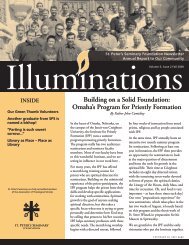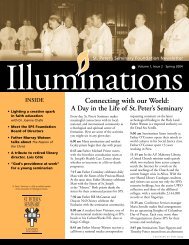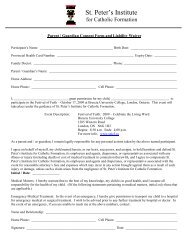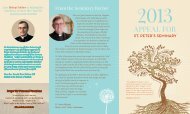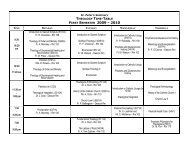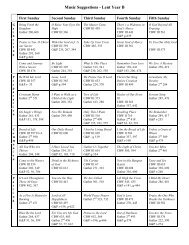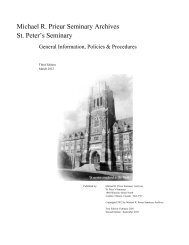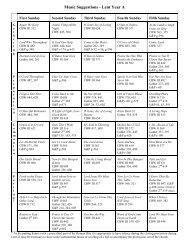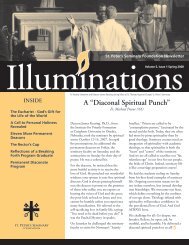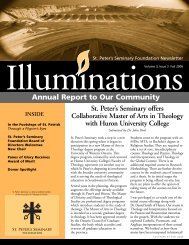Systematic Theology- 5113A - St. Peter's Seminary
Systematic Theology- 5113A - St. Peter's Seminary
Systematic Theology- 5113A - St. Peter's Seminary
Create successful ePaper yourself
Turn your PDF publications into a flip-book with our unique Google optimized e-Paper software.
12will present the results of your research and analysis of the text. (You must footnoteeverything you borrow either from your primary or secondary sources, using the MLAstyle). You should do more than summarize what you have read; you should analyse thetext or texts in order to convey the authors' meaning, the points that they are trying to getacross to their readers. What are they saying and how are they saying it? What is thesubstance and form of their argument or point of view? A good way to show that youunderstand the writer's views (as opposed to just repeating them) is to come up withexamples of your own to illustrate his or her points.The second part of the assignment is evaluative. This part is ordinarily shorterthan the first, but even more crucial. In the first part, you examined what selectedChristian writers, scholars, and theologians have to say about your question or issue. Thesecond part is the place where you say what you think about it. You will reflect on andevaluate what you have discovered in the course of your research. Do you agree ordisagree with the authors you have been examining? Why? What are the strengths andweaknesses of their views? If the authors you have read disagree amongst themselves,whose views do you find most convincing? Why? If you have been focusing on oneauthor in particular and you largely agree with him or her, what are the kinds ofobjections others might raise against him or her, and how would you defend your adoptedposition? If you are investigating a biblical or historical issue, how is it applicable to thecontemporary situation and contemporary faith? What further issues does your researchraise for you, or how does it connect to other theological issues?These are only examples of the kinds of approaches you might take to this part ofthe paper. It is an opportunity for you to be creative. Your reflection will be bothpersonal and scholarly. It will be personal in the sense that it represents what you thinkon the matter at hand. It will be scholarly in that you will support what you think byrational argumentation. You may or may not want to make reference to your ownexperience in this section. Your personal experience is relevant insofar as it illustratesand illuminates the issue. You want to avoid two extremes: on the one hand, relatingpersonal experiences for their own sake; on the other hand, simply lining up the views ofothers without appropriating the issue for yourself and making a judgment about it,however preliminary or limited that judgment may be. The key is to show your readerthat you have been thinking about the question and can say something about it in yourown voice. This is more difficult to do in most cases than the research, because you haveto grapple with the issue yourself and commit yourself to some judgments about it. Themore you do so and the more deeply you explore and unpack your ideas, the betterchance you have of writing a good reflection section. This part of the paper is crucial inthe evaluation process.RESEARCHING THE ESSAYYou will likely have done some preliminary reading in order to have picked atopic. Now you want to investigate this topic more thoroughly. You may want to beginwith encyclopedia articles and textbooks to get an overview. Often these will provide





